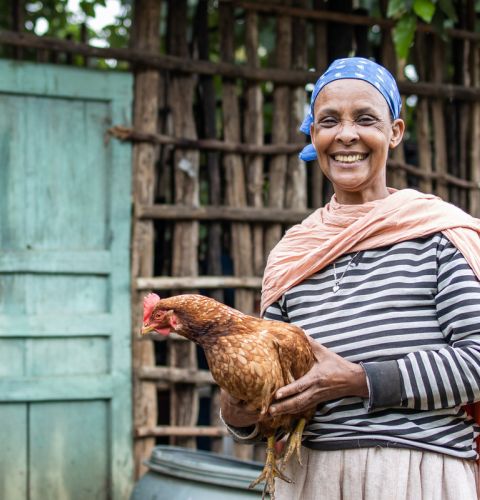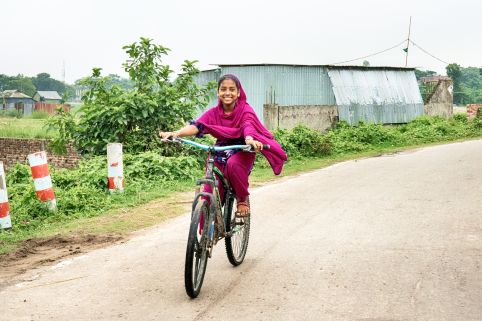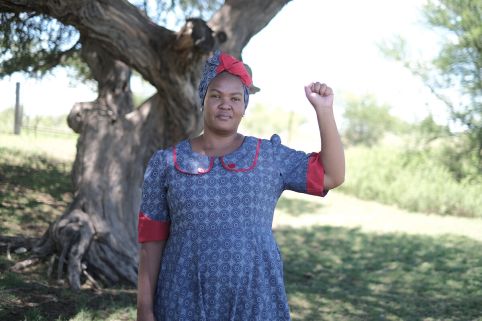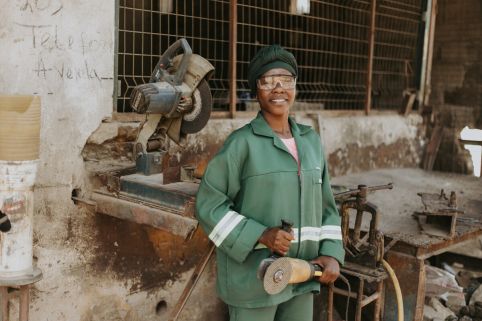We put the rights of women and girls at the heart of all we do, because the denial of women’s and girls’ rights is one of the biggest causes of poverty worldwide, and a grave injustice.
Learn more about gender equality, what ActionAid does in this area and the impact we have through our work helping adolescent girls, challenging violence against women and girls, and fighting for women's economic rights.
Why we focus on the rights of women and girls
Poverty is complex. It’s more than a lack of money. It’s also a lack of choice and power.
For women and girls, poverty means having fewer opportunities than men and boys. In the world’s poorest places this means living on the margins of society, often facing discrimination, exploitation and violence.
From the moment they’re born, many girls are seen and treated as less than boys. Girls are less likely to go to school than their brothers, and millions of girls worldwide are married as children, often to much older men.1
All over the world women and girls have less social, economic and political power, which can lead to their human rights being denied. Gender inequality is the root cause of women’s rights abuses. ActionAid supports women and girls to claim their rights.
Women’s rights are human rights
In 2015, all member states of the UN signed up to a global goal to achieve gender equality and the empowerment of all women and girls by 2030.
Because human rights apply to men and women equally, this means they can overlook women’s specific needs. So women’s rights include those that that are specific to women, or that need to be expanded to take account of women’s experiences and situations.
For instance, the use of mass rape as a weapon in war is a form of sexual violence that overwhelmingly targets women and girls, and it is now recognised as a crime against humanity within the framework of human rights.
Other fundamental women’s rights issues are violence against women and girls (VAWG), women’s economic inequality and empowerment, sexual and reproductive health and rights (SRHR) and women’s political representation.
Women’s rights are only on the international political agenda because of the tireless work of women’s rights organisations and movements fighting for change. But we still have a long way to go.
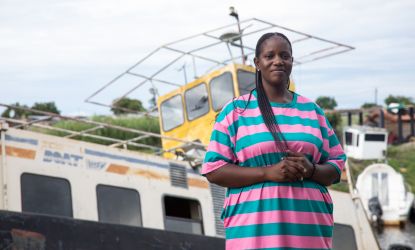
Tackling violence against women and girls in Zambia
Through the Resilient Inclusive Sustainable Environment (RISE) project, ActionAid Zambia is addressing gender-based violence in the fisheries sector. The project strengthens women’s access to resources and establishes safe spaces for survivors.
At the centre of this response is Gloria Ngenda, a psychosocial counsellor at the YWCA drop-in centre in Mongu. “The drop-in centre is the heart of YWCA,” Gloria explains. “This is where we handle gender-based violence issues and help women from the fishing camps.”
With support from ActionAid, women are trained to understand their rights and where to report abuse. “They are told what to do if they face situations like sex-for-fish — where to go,” Gloria says.
As Zambia faces its worst drought in decades, fishing communities in Western Province are under immense strain. With dwindling fish stocks and shrinking incomes, harmful practices such as “sex-for-fish”, where women are coerced into sexual exploitation in exchange for access to fish, have intensified.
Shelters provide protection for survivors who cannot safely return home.
We keep counselling them until they are ready."
As aid funding comes under threat, Gloria stresses that sustained global action is critical to protect women facing climate-driven violence.
Gloria is a psychosocial social counsellor at the drop-in centre in Katongo, Zambia.
Loliwe Phiri / ActionAid
What is discrimination against women?
There is no country in the world where women and girls as a group are not disadvantaged in relation to men and boys.
The UN Convention on the Elimination of All Forms of Discrimination against Women (CEDAW) is ‘the international bill of rights for women’. It defines discrimination against women as:
Any distinction, exclusion or restriction made on the basis of sex which has the effect or purpose of impairing or nullifying the recognition, enjoyment or exercise by women, irrespective of their marital status, on a basis of equality of men and women, of human rights and fundamental freedoms in the political, economic, social, cultural, civil or any other field.
It is important to recognise that different groups of women can be further disadvantaged, or discriminated against differently, based on other aspects of their identities. This can include race, disability, class and sexual orientation.
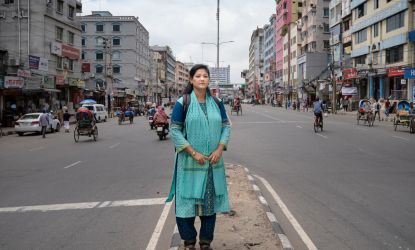
Fatema, 41, the manager of The Women’s Cafe in Dhaka, which is run by ActionAid Bangladesh’s local partner Karmojibi Nari and supports women who work in the ready-made-garment industry
Fabeha Monir/ActionAid
Supporting garment workers claim their rights
Fatema, 41, is the manager of The Women’s Café in Mirpur, Dhaka, run by ActionAid Bangladesh’s local partner Karmojibi Nari. Since 2020, she has supported women working in Bangladesh’s ready-made garment industry, many of whom face low wages, rising living costs, and unsafe working conditions.
Each morning, Fatema arrives early to hold one-to-one sessions with garment workers. The café is more than a meeting place, it is a safe space where women can share their struggles, access legal advice, attend rights-based training, and simply rest. Between long factory shifts and unpaid care work at home, many rarely have time to relax.
“The women feel safe here,” Fatema says. “They can speak openly about their problems, whether it’s workplace harassment, unpaid wages, or losing their jobs.”
She helps women understand their rights, supports those who have lost employment to find new work, and organises workshops on leadership and workplace safety.
Fatema’s commitment is deeply personal. Forced into marriage as a child, she had to abandon her education. “I once dreamed of becoming a teacher,” she reflects. “Now, by helping women learn about their rights, I feel that dream has come true.”
Through The Women’s Café, women garment workers are building confidence, leadership, and collective power, demanding dignity, fair wages, and justice in an industry that depends on their labour.
What is ActionAid doing for women’s rights?
ActionAid supports and campaigns with women and girls living in some of the world’s poorest places as they challenge the root causes of poverty and injustice. Supporting women and girls as they claim their rights and lead their communities out of poverty is the most effective way of changing lives for good.6
ActionAid stands with the courageous women speaking out for change in their communities, and backs the grassroots women's rights organisations they lead. We challenge harmful societal norms which create gender inequality and allow abuses like violence against women and girls to continue.
We tackle unfair economic systems that hold women and girls back, and promote their access to justice. We ensure that local women's rights organisations are at the forefront of humanitarian response work.
What about men’s and boys’ rights?
Men and boys also experience abuses of their rights, including sexual and domestic violence. But everywhere, violence is overwhelmingly perpetrated by men against women, making it one of the most widespread abuses of human rights worldwide.
We put the rights of women and girls first, because no community can prosper together when half its citizens are denied the rights enjoyed by the other half. That is why ActionAid focuses on this issue.
Men and boys are part of the solution
To end violence against women and girls, men and boys must be involved in changing attitudes and behaviour in families and communities. And because men dominate positions of power and decision-making roles, they are important allies in the fight for women's rights.
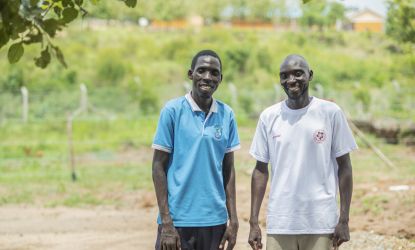
Men as allies for women's rights
Moses and David fled South Sudan in 2016 when violent conflict forced hundreds of thousands to seek safety in Uganda. Now living in Imvepi refugee settlement, they are outspoken advocates for the rights of women and girls.
In the settlement, they have witnessed the risks women and girls face — including gender-based violence, early and forced marriage, teenage pregnancy, and high maternal death rates. Rather than remain silent, they chose to act.
We realised that change cannot happen if men are not involved. We must challenge the harmful practices in our own communities.”
Together, they raise awareness about gender equality, encourage men to share domestic and care responsibilities, and promote women’s access to education and employment. They work closely with organisations such as Community Transformation Agenda (COTA) and ActionAid, supporting community dialogues and campaigns that have helped reduce violence and strengthen protection systems.
Through their leadership, Moses and David are showing that men can be powerful allies, helping to transform attitudes, shift power, and build safer communities for women and girls in displacement settings.
Moses (white shirt) and David (blue shirt), from South Sudan, now live in Imvepi refugee settlement and are vocal advocates for the rights of women and girl
Immaculate Bashaba /ActionAid
Footnotes
- 1Ellsberg, M. et al. (2014) ‘Preventixon of violence against women and girls: what does the evidence say?’, The Lancet, Vol 385, No. 9977. Pp. 1555-1566. http://www.thelancet.com/journals/lancet/article/PIIS0140-6736(14)61703-7/abstract. Accessed May 2015.
- 2https://www.actionaid.org.uk/latest-news/three-in-four-women-experience-harassment-and-violence-in-uk-and-global-cities
- 3https://www.actionaid.org.uk/sites/default/files/publications/actionaid_double_jeopardy_decent_work_violence_against_women_6.pdf P.9
- 4https://www.actionaid.org.uk/latest-news/domestic-violence-kills-five-women-every-hour
- 5Ellsberg, M. et al. (2014) ‘Prevention of violence against women and girls: what does the evidence say?’, The Lancet, Vol 385, No. 9977. Pp. 1555-1566. http://www.thelancet.com/journals/lancet/article/PIIS0140-6736(14)61703-7/abstract. Accessed May 2015.
- 6https://www.actionaid.org.uk/sites/default/files/publications/actionaid_double_jeopardy_decent_work_violence_against_women_6.pdf
Page updated 16 February 2026
